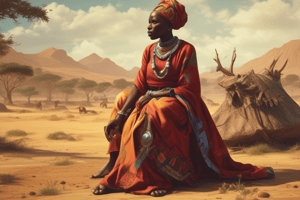Podcast
Questions and Answers
What is the primary focus of African studies?
What is the primary focus of African studies?
- The study of African languages
- The study of African literature and philosophy
- The study of Africa, its cultures, societies, and peoples (correct)
- The study of African politics and governance
Which subfield of African studies explores the history of Africa?
Which subfield of African studies explores the history of Africa?
- African Literature
- African History (correct)
- African Philosophy
- African Politics
What is Afrocentrism?
What is Afrocentrism?
- A movement that seeks to unite and empower people of African descent worldwide
- A theory that argues that African underdevelopment is a result of exploitation by external powers
- A process of dismantling colonial legacies and promoting African independence and self-determination
- A cultural movement that emphasizes the importance of African perspectives and experiences (correct)
What is Decolonization?
What is Decolonization?
Who is a prominent figure in African studies?
Who is a prominent figure in African studies?
What is Neocolonialism?
What is Neocolonialism?
Which theory argues that African underdevelopment is a result of exploitation by external powers?
Which theory argues that African underdevelopment is a result of exploitation by external powers?
What is the primary focus of Postcolonial Theory?
What is the primary focus of Postcolonial Theory?
Flashcards are hidden until you start studying
Study Notes
Definition and Scope
- African studies is an interdisciplinary field of research that focuses on the study of Africa, its cultures, societies, and peoples.
- It encompasses various disciplines, including anthropology, history, linguistics, literature, philosophy, politics, and sociology.
Subfields
- African History: explores the history of Africa from ancient times to the present day, including the transatlantic slave trade, colonialism, and independence movements.
- African Literature: examines the oral and written literary traditions of Africa, including folktales, poetry, and novels.
- African Philosophy: investigates the philosophical thought and traditions of Africa, including ethics, metaphysics, and epistemology.
- African Politics: analyzes the political systems, institutions, and processes of African countries, including democratization, governance, and development.
Key Concepts
- Afrocentrism: an intellectual and cultural movement that emphasizes the importance of African perspectives and experiences.
- Pan-Africanism: a movement that seeks to unite and empower people of African descent worldwide, promoting solidarity and cooperation.
- Decolonization: the process of dismantling colonial legacies and promoting African independence and self-determination.
- Neocolonialism: the continued exploitation and domination of Africa by external powers, often through economic means.
Theories and Debates
- Dependency Theory: argues that African underdevelopment is a result of exploitation by external powers.
- Modernization Theory: suggests that African countries can develop by adopting Western-style modernity.
- Postcolonial Theory: critiques the lingering effects of colonialism and promotes African agency and self-definition.
Key Figures
- Cheikh Anta Diop: a Senegalese historian and anthropologist who pioneered Afrocentric scholarship.
- Frantz Fanon: a Martinican philosopher and revolutionary who wrote extensively on colonialism and racism.
- Walter Rodney: a Guyanese historian and political activist who critiqued colonialism and imperialism.
Regional Focus
- West Africa: explores the cultural, historical, and political dynamics of countries such as Nigeria, Ghana, and Senegal.
- East Africa: examines the experiences of countries like Kenya, Tanzania, and Ethiopia, including their colonial histories and contemporary challenges.
- Southern Africa: focuses on the complex history of countries like South Africa, Namibia, and Angola, including apartheid and post-apartheid dynamics.
Definition and Scope
- African studies is an interdisciplinary field of research that focuses on the study of Africa, its cultures, societies, and peoples.
- It encompasses various disciplines, including anthropology, history, linguistics, literature, philosophy, politics, and sociology.
Subfields
- African History explores the history of Africa from ancient times to the present day, including the transatlantic slave trade, colonialism, and independence movements.
- African Literature examines the oral and written literary traditions of Africa, including folktales, poetry, and novels.
- African Philosophy investigates the philosophical thought and traditions of Africa, including ethics, metaphysics, and epistemology.
- African Politics analyzes the political systems, institutions, and processes of African countries, including democratization, governance, and development.
Key Concepts
- Afrocentrism emphasizes the importance of African perspectives and experiences.
- Pan-Africanism seeks to unite and empower people of African descent worldwide, promoting solidarity and cooperation.
- Decolonization involves dismantling colonial legacies and promoting African independence and self-determination.
- Neocolonialism is the continued exploitation and domination of Africa by external powers, often through economic means.
Theories and Debates
- Dependency Theory argues that African underdevelopment is a result of exploitation by external powers.
- Modernization Theory suggests that African countries can develop by adopting Western-style modernity.
- Postcolonial Theory critiques the lingering effects of colonialism and promotes African agency and self-definition.
Key Figures
- Cheikh Anta Diop was a Senegalese historian and anthropologist who pioneered Afrocentric scholarship.
- Frantz Fanon was a Martinican philosopher and revolutionary who wrote extensively on colonialism and racism.
- Walter Rodney was a Guyanese historian and political activist who critiqued colonialism and imperialism.
Regional Focus
- West Africa explores the cultural, historical, and political dynamics of countries such as Nigeria, Ghana, and Senegal.
- East Africa examines the experiences of countries like Kenya, Tanzania, and Ethiopia, including their colonial histories and contemporary challenges.
- Southern Africa focuses on the complex history of countries like South Africa, Namibia, and Angola, including apartheid and post-apartheid dynamics.
Studying That Suits You
Use AI to generate personalized quizzes and flashcards to suit your learning preferences.




